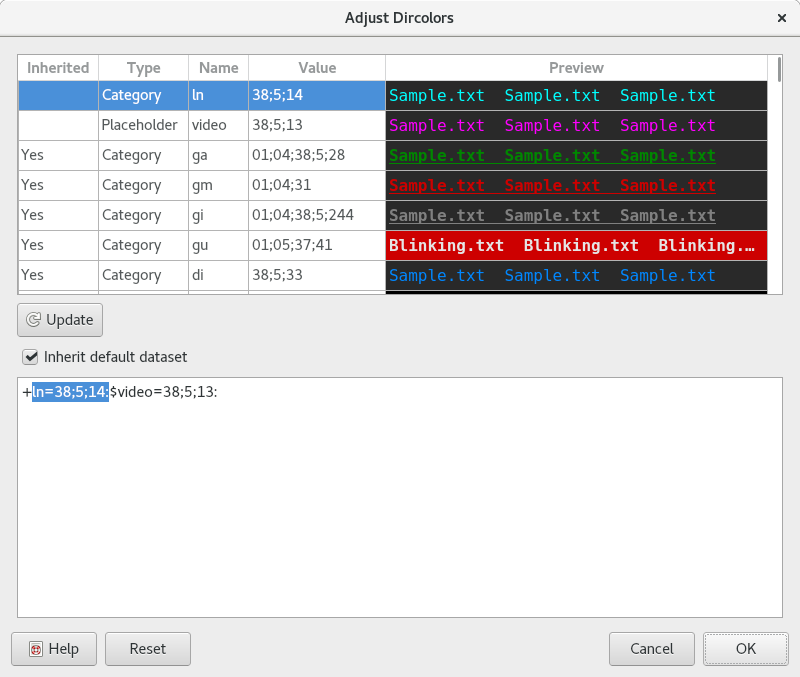Dircolors Editor¶
The Dircolors Editor dialog is shown when editing the Files/Dircolors profile setting. It is equivalent to the Dircolors tab in the Theme Editor dialog.
Changes made within the dialog take effect immediately and will be visible in the Files tool for the affected terminal or terminals. Canceling the dialog will revert all changes. To undo changes made using the dialog without closing it, use the Reset button.
Note
This dialog will not affect the LS_COLORS environment variable used by ls(1) within terminals that are already running. Refer to the SetLsColorsEnvironmentVariable profile setting.
The dircolors setting itself consists of a string in dircolors(1) format with some qtermy extensions. These extensions are:
- A leading plus sign (+) indicates that the compiled-in default dircolors should be inherited. Entries defined by the string will override inherited entries.
- A completely empty string also inherits the compiled-in default dircolors. To specify no dircolors whatsoever, use the string
rs=0.- The categories
ga,gm,gi, andguspecify the colors used by thegit status charactersin the Files tool for added, modified, ignored, and unmerged (conflict) files respectively.- It's possible to define named placeholders using the specifier syntax
$name=value. The value can then be substituted into file glob entries using the syntax*.ext=name. The compiled-in default dircolors uses the placeholdersaudio,video, andarchivefor all file glob entries. These can be overridden by redefining them.
qtermy's dircolors implementation has the following limitations:
- File glob entries must be of the form
*.extension.- The categories
rs(regular file) andmh(multiple hard links) are not supported and will be treated as a no-op if defined.- A non-empty dircolors string must end in a colon (:) character.

Example Dircolors Editor dialog.
The dialog has the following elements:
- Table View
- A list of all dircolors entries, including inherited entries. Click a (non-inherited) entry to select its text within the dircolors string. Double-click an entry to paste its text at the end of the dircolors string.
- Inherited
- Whether each dircolors entry is inherited from the default compiled-in dircolors. Non-inherited entries appear first in the list.
- Type
- The type of each dircolors entry: one of placeholder, category, or extension.
- Name
- The name portion of each dircolors entry.
- Value
- The value portion of each dircolors entry.
- Preview
- A preview of each dircolors entry's text. Blinking text does not blink in the preview, but does blink in the Files tool.
- Update
- Parses changes to the dircolors string, updating the table if successful.
- Inherit default dataset
- A convenience check box which removes or adds the plus sign (+) at the beginning of the dircolors string indicating that the compiled-in default dircolors should be inherited. Note that a completely empty string is considered to inherit the compiled-in default dircolors.
- Dircolors string
The raw dircolors string. Make edits here, then click the Update button to update the table.
The string should not contain newlines or other whitespace. A non-empty string must end in a colon (:) character.
- Reset
- Discards changes made in the dialog.